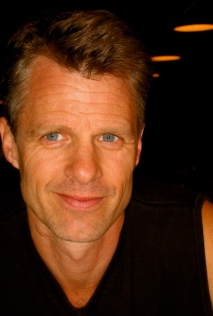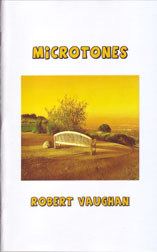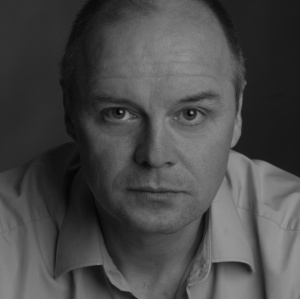 Leah McMenamin is a writer of poetry and prose from New Zealand by way of Australia, Southeast Asia and, most recently, Ethiopia. She is the poetry editor at The Open Road Review. A 2012 Pushcart nominee, her poems and short stories have been published in Takahē Magazine, Poetry NZ, The Avalon Review, The Typewriter, and numerous other locations. As winter draws near in her hemisphere, she can generally be found with an overly large cup of coffee and a book trying to find the warmest spot in her Wellington house.
Leah McMenamin is a writer of poetry and prose from New Zealand by way of Australia, Southeast Asia and, most recently, Ethiopia. She is the poetry editor at The Open Road Review. A 2012 Pushcart nominee, her poems and short stories have been published in Takahē Magazine, Poetry NZ, The Avalon Review, The Typewriter, and numerous other locations. As winter draws near in her hemisphere, she can generally be found with an overly large cup of coffee and a book trying to find the warmest spot in her Wellington house.
_____________________________________
ME: Thank you so much for agreeing to be one of the judges for FLASH MOB 2013, Leah McMenamin. We’re pleased to see you on this panel, and we look forward to hearing a little more about you. Let’s start with something you said a while back…
You’ve mentioned before that you like ‘bare-bones’ writing. Tell us what that means, in terms of the kind of reader and writer you are.
LM: Thanks for inviting me to take part in this experience! I’m really excited about the judges I get to work with, and getting to jump into all the submissions coming through.
When I say “bare-bones”, I think of writing that invites the reader to draw their own conclusions, writing that doesn’t rely on wordy sentences but on the pace of its narrative and the complexity of its characters. I like simple, pared-back writing because I feel the author has acknowledged my intelligence and my ability to follow the storyline without having to add too many descriptive or overbearing elements.
ME: Oh, I know what you mean. I’ve come across some great examples of this in recent years – James Claffey and Susan Tepper come to mind, for example. Can you name some current writers who do this, in NZ or internationally?
LM: I guess this really reminds me of Janet Frame’s writing (you can visit her Literary Trust website here) and Elizabeth Welsh, who I have got to know through the Tuesday Poem collective. Elizabeth won the Auckland University Press Emerging Poet Award in 2012, and her poems have inspired me greatly. You can visit her website here.
I try to remember, when I write, that most people out there are creative, intelligent, and curious, and I would want my writing to encourage those characteristics further in readers.
ME: I like the way you think about your readers. Tell us about one of your own stories that you feel works in this way – honouring and encouraging your readers.
LM: I hope that I continue to improve in doing this as my journey in writing continues. My most recent publication, ‘Jack, Now Gone’, explores a mother’s relationship with a child who is now absent. I try to keep the writing stark and invite the readers to draw their own conclusions throughout it. Something that has worked very well for me in practicing this, and which I would encourage other writers to do, is to engage with the ‘Modern Lettuce’ website, which is an extension of the Victoria University School of Modern Letters, and has so many useful activities to help extend you as a writer, and as a reader, too.
ME: Who are your writing heroes, and why? And have those heroes changed as you have evolved as a writer yourself? Do some of your childhood writing heroes still capture your imagination as they once did?
LM: When I read a short story by Alice Munro, I still get a surge of creativity that is very close to an electric shock. She makes me want to be a better writer, and a more voracious reader, every time I read something by her. I also adore Margaret Atwood, Witi Ihimaera, Zadie Smith and E. Annie Proulx – an eclectic mix, admittedly!
ME: Electric shock – I like that! I feel the same way about Annie Proulx and Cormac McCarthy. I find an honesty in the starkness of both of these writers – in the form and characters. And, as an aside, they both read aloud very well, too.
LM: As a child, I found books a source of sustenance for me, both creatively and intellectually, and I have very strong memories of reading two books over and over again – ‘Alice in Wonderland’ and ‘The Secret Garden’. They have both continued to grip my imagination, and the other writers I loved as a child – Roald Dahl, Dr. Seuss, Brian Jacques – still offer the same security and inspiration they did to me as a child.
ME: Classics – agreed! The Butter Battle Book remains a favourite in my family…
LM: Wonderful! Doesn’t it just make you feel all warm inside? I love the cartoons they’ve turned it into – you can still watch them on YouTube.
ME: You work as Poetry Editor at Open Road Review. Tell us about that, and what about reading and reviewing poetry that thrills you.
LM: The Open Road Review (ORR) is an amazing publication that is still relatively new. The editor, Kulpreet Yadav, is a growing force in the Indian literary scene and his work has really brought the ORR to greater attention. The ORR was established by Kulpreet as a journal that would strive to give a voice to new, talented writers (it publishes both poems and short stories, which are edited by Shanti Perez) as well as honoring the diverse backgrounds and traditions our writers come from.
Reading and reviewing poetry gives me a sense of connectedness – it helps me to remember there are great forces of creativity out there from many, many different backgrounds. I love the thought that a poem published in the ORR might spur the author onto greater writing heights, or that it might inspire a reader to have a go at writing themselves, or might speak to someone in a way they never thought possible.
ME: That sounds really interesting. Can you point us to some current Indian writers you admire? We are an international Flash Mob, after all!
LM: An outstanding young Indian poet I really admire is Sudeep Sen. His work is really challenging the landscape of Indian literature, in my opinion, the same way that Arundhati Roy really experimented with her work ‘The God of Small Things’. Sudeep’s writing was featured in Volume 5 of the Open Road Review.
Kulpreet Yadav, the founder of the Open Road Review, is also a source of great admiration to me. You can catch him at his main website here, or read some of his posts on the Open Road Review blog.
ME: Some say there’s a real connection between flash and poetry. Care to discuss that, too?
LM: I think there is a real interconnectedness between flash and poetry. Both require a precise handling of words in a (generally) limited space. Both require the communication of an idea in a swiftly changing format. So in that sense I see a connection between the two.
ME: Yes I agree. I sometimes think some poetry reads like story-telling (like these three poems by Sam Rasnake, especially ‘Lines Torn from a July Morning’ and ‘Little by Little, the Beautiful World’, and ‘8am’ by JP Reese), and some flash reads like poetry (like Bill Lantry’s ‘Somnambulist’ or Nicolette Wong’s ‘Pastoral Hide and Seek’). I really like how the short form allows for such genre-bending.
And now back to you…
What was the first piece you ever published? And what was the most recent piece you’ve had published?
LM: The first piece I ever had published was a poem in Poetry NZ called ‘I Will Know’. I look back at it now and just think about how much I’ve learned over the past couple of years, and I feel so grateful.
Most recently I’ve had a couple of short stories published by Takahe, the most recent of those being ‘Jack, Now Gone’.
ME: Yes, I recall reading this in Takahe 77 earlier this year (my copy’s sitting on my shelf beside me). I especially like the opening of this story, the way you create a salty dark mood:
He left the day the tide receded, three years ago today. Kate remembered it well, the way the seaweed was left on the bare shores, writhing strands of green mermaid heir shed across the rocks. It had begun to rot in the sun, releasing stench that permeated every area of the house.
I also like the other vivid descriptions in this piece, like this:
Kate could see the toetoe nodding their fair heads in the breeze, and a tui was calling. She sat on the front porch steps and watched as the early sun stained the clouds all shades of apricot and violet and curdled milk.
There’s something very New Zealand about this setting. Is specific geography often important in your work?
LM: Absolutely. I think the idea of ‘bare bones’ writing, if you like, naturally lends itself to specific descriptions, and I try to be careful with the way I describe settings.
ME: And speaking of geography, you live in the windy city of Wellington. Tell us a little about how your environment impacts your approach to writing.
LM: To me, Wellington is the ultimate city for creativity – and I know that’s a big call to make. It sits by the sea, and it might be the open salty air, or the constant wind to wake you up (though all the coffee served in the city will do that too), but I feel my most alive when I’m writing in Wellington.
The environment is physically stunning – lots of beautiful rolling hills, very accessible art work, and a thriving artistic community. I feel like the city and its inhabitants prompt me to be more creative and more productive.
ME: What are you most looking forward to with FLASH MOB 2013?
LM: Hopefully getting to read some experimental flash fiction that broadens my horizons, and working with all those wonderful flash authors out there!
ME: We love experimentation, too. Tell us something you’ve read recently that inspires you for its experimental nature.
LM: I follow The Altered Scale religiously. It is associated with the Altered Scale Press which is dedicated to experimental writing. I particularly loved the poem ‘Death’ by Dan Ryan which featured in May on the website. I love the structure of the poem, the way you seem to physically follow the words like a trail of ants, the humor and creeping sadness all swelling into one fantastic poem.
ME: Fascinating! Thanks for all you’ve shared with us today, Leah. We appreciate the time you’ve given for this interview and for judging the 2013 FLASH MOB competition.
__________________________________
JOIN THE MOB — Submissions deadline: June 10!
 FLASH MOB 2013 showcases more than 100 stories from more than 100 participating writers from all over the globe. CLICK ON THE PHOTOS below to find out more about the flash enthusiasts who wrote from or about those places. To read their stories CLICK ON THEIR PHOTOS.
FLASH MOB 2013 showcases more than 100 stories from more than 100 participating writers from all over the globe. CLICK ON THE PHOTOS below to find out more about the flash enthusiasts who wrote from or about those places. To read their stories CLICK ON THEIR PHOTOS. 















